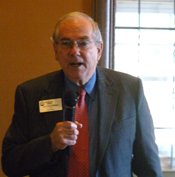Downtown Jackson is an ideal place for a law school, Jim Rosenblatt told attendees at Friday Forum at Koinonia Coffee House this morning. The capital city provides aspiring lawyers with opportunities to test their skills and help low-income families at the same time.
Rosenblatt has been dean of the Mississippi College School of Law for eight years. A native Mississippian, he saw the value of a law degree after seeing his father help his grandfather negotiate with the state in an eminent domain case.
He joined the ROTC program in law school and was commissioned in the U.S. Army a few years before the end of the Vietnam War.
"My uniform still fit at the end of four years, so I stayed in for 30," Rosenblatt said. He served as a JAG officer in places as far apart as Hawaii and Germany. After retiring from the army, he returned to Jackson as dean.
"There is no more beautiful place than downtown Jackson," he said. "... You know, we have a 10-minute rush hour in Jackson. From 5 to 5:10, I watch those people pour out of that state parking garage, and every one of them is holding a cell phone, talking. But at about 5:15, after the traffic rush is over, I like to go up and just walk through the capitol. I think it's one of the most beautiful buildings around.
"I'm very interested to see development in downtown Jackson; I'm waiting for the Penguin to open. There's just a lot going on."
Rosenblatt said the law school's location downtown gives students a sense of what areas of practice are available. Being in the capital city also provides future lawyers part-time work opportunities and externships so they can gain experience with agencies, organizations and government offices.
In west Jackson, the school runs the Mission First Legal Aid Clinic, which provides legal services to people who would not otherwise be able to afford it. Law students, attorneys and others volunteer to assist clients whose household income is less than 200 percent of the poverty level.
"There is a crying need for legal services for people who can't afford them," Rosenblatt said. "These are working people. These are people who might be working two or three jobs, and they're raising children and taking care of grandchildren.
Rosenblatt said the school is also trying to form a partnership with the chancery court to help people file things like divorce papers.
"I would encourage you, in your work around (the area), if you see people from your church and others who might need that kind of assistance, hook them up," he said.


